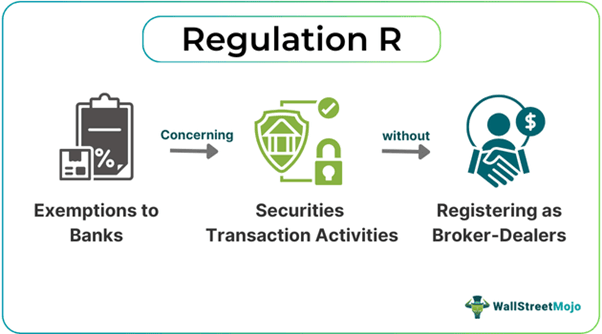Table of Contents
What Is Regulation R?
Regulation R refers to the Securities Exchange Act of 1934, providing exceptions for banks to offer specific brokerage services without being registered as broker-dealers. It aims to widen banks' operational scope by allowing them to offer specific securities transactions like annuities and mutual funds to their retail account holders.

It helps integrate financial services and enhances market efficiency, as per the Gramm-Leach-Bliley Act's aim of modernizing financial laws after 1999. Banks have to comply with particular exemptions or associate with the Securities Exchange Commission (SEC) 's registered brokers-dealers regarding non-exempt functions, enabling adherence to the laws.
Key Takeaways
- Regulation R allows services without registering as broker-dealers under the Change Act.
- Its requirements are- understanding exempt activities by banks, implementing a comprehensive compliance program, maintaining adequate records,
- seeking legal advice, coordinating effectively, being aware of exemptions, and ensuring their compensation meets the "chiefly compensated" test.
- It provides exemptions like registration as brokers-dealers, exempt securities transactions, employee welfare schemes, agent status, referral fee charging, and marketing limitations.
- Its significance is outlining the regulatory environment for banks in securities, maintaining rivalry, facilitating consumer access, minimizing burdens, increasing market transparency, and building trust.
Regulation R Explained
Regulation R represents exceptions to banks implemented in 2007 regarding their securities activities. It particularly deals with broker exceptions related to banks, permitting them to perform certain functions without the need to register as broker-dealers. Under the regulations, banks can undertake different activities like custody arrangements, trust services, and third-party networking while preserving adherence to securities laws.
Moreover, banks can also direct their clients to their partner registered broker-dealers and take specific referral fees in turn under unique situations. Such regulation has also opened wider financial service offerings to customers by the banks. It has increased the competitiveness of the market and created mammoth partnerships within regulatory laws.
It has helped delineate the boundaries between brokerage and banking services. With its help, banks can now offer a broad array of financial products to amplify their service offerings, attract new customers, and make good revenues. Nevertheless, it also mandates banks to manage compliance measures and partnerships carefully to minimize regulatory risks. The regulation has helped foster compliance and innovation in the finance industry.
In the financial world, it has fostered competition among broker-dealers and bankers. As a result, investors and consumers have access to diverse financial services under a single umbrella.
Requirements
It defines particular requirements for banks along with broker-dealers to adhere to the SEC Act of 1934, especially related to exemptions from the broker definition. Hence, it has the following requirements;
- Banks must know the required activities that have been exempted from broker registration under the regulation, such as trust and fiduciary or deposit sweep activities.
- Broker-dealers and bankers must execute detailed compliance manuals, including employee training, policies, monitoring, and procedures, to comply with the regulation.
- Proper and adequate records of all securities transactions must be maintained to demonstrate adherence to the regulation. The documentation includes the customers involved and transaction types.
- It recommends seeking legal advice from broker-dealers and banks to efficiently explore the regulatory environment and ensure compliance with every regulation's requirement.
- Broker-dealers and banks must necessarily coordinate properly to fulfill the regulatory needs effectively, which comprises training employees and developing compliance policies.
- Banks must be aware of particular exemptions applicable under the regulation, such as those concerning non-custodial securities lending transactions and foreign securities transactions done in agency capacity.
- Banks undertaking securities transactions in fiduciary or trust capacities in exchange for compensation must ensure that they meet the chiefly compensated test prepared and designed by the regulation. They can do so using a bank-wide approach or account-by-account approach.
Exceptions For Banks
There have been certain exceptions awarded to banks under the regulation r:
- It offers an exemption to banks pertaining to the obtention of registration as brokers-dealers for certain bank activities.
- Banks can do transactions consisting of exempt securities in the absence of registration.
- It also covers provisions related to employee welfare schemes under some special conditions.
- It permits banks to act as agents in limited instances without having to classify themselves as brokers.
- Banks can charge referral fees as per specific frameworks for networking modules.
- It imposes certain limitations on banks regarding how banks could market these services.
- All these exemptions for banks work only if they comply with all provisions of the regulations.
- In investment spaces, banks have been able to provide their service offerings due to these exemptions.
- Community banks engaged in GLBA-exempted activities receive support from the regulation frameworks.
- On the whole, it acts as a clarity provider to banks concerning their securities activities.
Significance
It has been heralded by banks and the financial sector as a significant step of the SEC for the following reasons:
- It clearly outlines the regulatory environment for the activities of banks in securities.
- It aids in maintaining rivalry parity amongst banks and broker-dealers.
- It facilitates consumer access to a wide variety of financial products.
- It minimizes regulatory burdens for banking companies engaged in securities transactions.
- It defines all allowed activities by banks in the securities market, thus increasing market transparency.
- It builds trust between financial institutions and consumers or investors.
- It aligns with more comprehensive financial compliance reforms after the Great Recession.
- It has proved vital to community banks with the objective of giving investment services.
- On a holistic note, it has become a principal factor in shaping the modern banking scenario.
